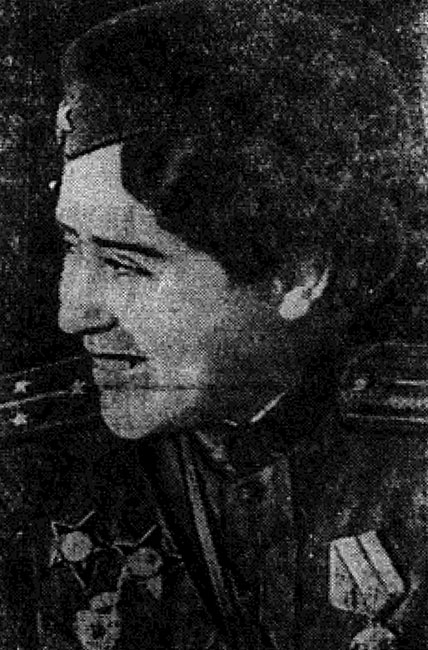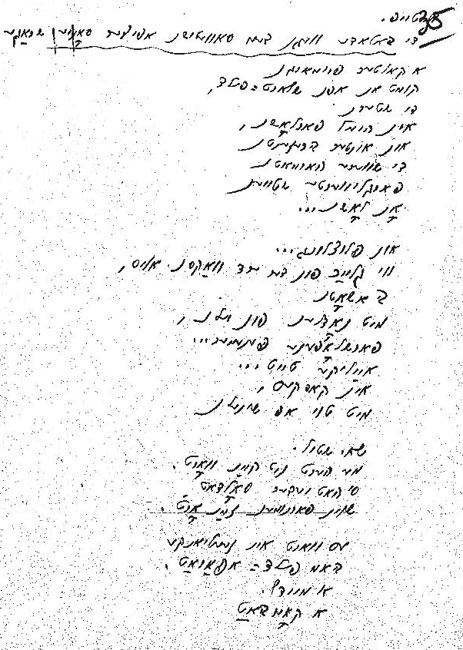Sonia Shraga was born into a Jewish family in the village of Plosko, Ukraine in 1920. Her work, along with members of her family in the fields of the local collective farm (kolkhoz), was highly appreciated. In 1938, after graduating from agricultural college, Sonia married Mikhail Rabinovich, a young Jewish journalist, and soon the couple moved to Stanislawów, part of the Polish territory that was annexed to the USSR in 1939.
When the war broke out on June 22, 1941, Sonia was a student in the history department of Stanislawów University. On the same day that her husband departed for the front with the rank of captain she volunteered to join the Red Army. While serving as a combat nurse with the 50th Infantry Division, along with other combat medics, Sonia rescued several dozen wounded Soviet soldiers from enemy fire and gave them first aid. She also served as a signal operator on the front lines. A member of the Communist Party since 1942, she served as deputy to the battery's political commissar (politruk), often leading the battery's soldiers in battle. After she completed a training course, due to her courage Sonia Shraga was appointed commander of an artillery battery. In May 1942, during the second battle of Kharkov, the artillery battery under her command was encircled and under heavy fire from German tanks. Despite the fact that her battery was outgunned, Sonia managed to hold out by destroying German tanks until reinforcements arrived. In June the whole artillery regiment in which she was serving was surrounded by Werhmacht troops. Shraga succeeded in leading dozens of her soldiers out of encirclement and rejoining the Red Army.
On November 23, 1942, during the battle of Voroshilovgrad, Sonia was severely wounded while riding on horseback to an observation post. She lost her left hand and her right hand was severely crippled. After being released from the hospital, Sonia was appointed commander of a mortar battery that provided professional retraining for Soviet soldiers who were not able to return to the battlefield.
On January 17, 1943 Sonia Shraga was decorated with the Order of the Red Star and, later, with the order of the Red Banner. She was also awarded the For the Defense of Stalingrad medal.
In the course of the war Sonia Shraga fought in an number of places on the Southeastern Front: in the areas of Kharkov, the Don, Kursk, Voronezh, and Stalingrad.
In 1944, while learning English at the Military Institute of Foreign Languages, Sonia was informed that her husband, then a colonel, had been killed during the battle of Minsk. About that time she also found out that her parents, brother, and sister with her four little children were killed in June 1942 by the Germans near the town of Slavuta, Ukraine. An article by Mira Aizenshtadt published in Yiddish on December 28, 1944 in Eynikayt (the newspaper of the Jewish Anti-Fascist Committee) described Sonia's grief at the loss of her family:
"Sonia can't talk about it…. She starts crying bitterly…
- My sister had such [good] children…. And she herself was such a beauty…. And my dear mother was such a gentle woman… and [almost] all of them were shot to death by machine-gun fire … afterwards [those who were still] alive [i.e. only wounded] were thrown into the grave. I can't forget this day or night…."
Apparently during the first years after the war, the Soviet Yiddish poet Moyshe Teyf wrote the poem "Der artillerist Sonye Shrage" It was published in Eynikayt on November 25, 1947."
The Ballad about Sonia Shraga Written by Moyshe Teyf
Moyshe Teyf (1904 - 1966) was a Soviet Yiddish poet who served as an artillery soldier in the Red Army during World War II. Teyf was arrested twice: in 1937 (he was released in 1941); the second time was in 1951 (he was released after the death of Stalin). Many of his poems dealt with the fate of Jews during the war, including those who were murdered in the Holocaust.
|
Moyshe Teif |
משה טייף |
|
It is a cold morning |
אַ קאַלטער פֿרימאָרגן |
|
Then suddenly … |
און פּלוצלינג... |
|
Sha! Be quiet! |
שאַ. שטיל. |
|
In cotton pants, |
אין הויזן וואַטאָווע, |
|
Her eyes, lilac-colored |
פֿון אויגן עס בליצן |
|
On her little desk |
עס ליגט |
|
Every bush, |
יעדער קוסט, |
|
Only the captain from Munich |
נאָר ס'ווייס ניט פֿון מינכען |
|
Far from her, in a dug-out, |
דאָרט ווײַט אין בלינדאַזש, |
|
Suddenly |
און פּלוצלינג |
|
The sound of whistling was heard! |
אַ פֿײַף מיטן פֿײַפֿל! |
|
She looked through her binoculars: |
זי קוקט אין בינאָקל: |
|
The captain, |
דער הער קאפּיטאַן, |
|
Submissively, in a low voice, |
ער פֿרעגט דעם פּאָלקאָווניק |
|
The colonel laughs and says, |
ער לאַכט דער פּאָלקאָווניק: |
|
Attempting to appear polite |
די פֿאַלשע נשמה, |
|
Stood up and |
ער טוט זיך אַ הויב. |
|
Two Jewish eyes |
צוויי ייִדישע אויגן |
|
"I will answer your question, From: GARF 8114-1-185, copy YVA JM/26153. |
"איך ענטפֿער אײַך, הער קאַפּיטאַן, סאָניע שראַגע!" |








